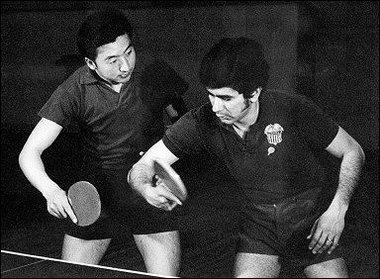1971年毛泽东利用中美乒乓球运动员在日本的民间交往,邀请美国乒乓球队访华,并在1972年,中国乒乓球队进行了成功的回访活动。这一系列事件巧妙地打破了中美之间关系的僵局,正式揭开两国改善关系的序幕,促使实现尼克松访华乃至中美建交。其中所包含的灵巧微妙的外交技巧,被官方史家戏剧性夸饰为艺术地表明了中国领导人改变自己的国际战略意图,誉为“小球转动了大球”的“乒乓外交”。
 |
|
Chinese and American table tennis players practice in April 1971.
An American delegation was in China to mark the 35th anniversary of a visit by US table tennis players that helped end the Cold War between Beijing and Washington.
|
One of the first public hints of improved U.S.-China relations came on April 6, 1971, when the American Ping-Pong team, in Japan for the 31st World Table Tennis Championship, received a surprise invitation from their Chinese colleagues for an all-expense paid visit to the People's Republic. Time magazine called it "The ping heard round the world." On April 10, nine players, four officials, and two spouses stepped across a bridge from Hong Kong to the Chinese mainland, ushering in an era of "Ping-Pong diplomacy." They were the first group of Americans allowed into China since the Communist takeover in 1949.
Ten journalists, including five Americans, were also invited to cover the team's visit, ending the information blockade from the People's Republic in place since 1949. From April 11th to 17th , a delighted American public followed the daily progress of the visit in newspapers and on television, as the Americans played--and lost-- exhibition matches with their hosts, toured the Great Wall and Summer Palace, chatted with Chinese students and factory workers, and attended the Canton Ballet.
Premier Chou En-lai worked the public relations opportunity beautifully, receiving the Americans at a banquet in the Great Hall of the People on April 14. "You have opened a new chapter in the relations of the American and Chinese people," he told the unlikely diplomats. "I am confident that this beginning again of our friendship will certainly meet with majority support of our two peoples." He also extended an invitation for more American journalists to visit China, provided they do not "all come at one time." That same day, the U.S. announced plans to remove a 20-year embargo on trade with China. A Chinese table tennis team reciprocated by visiting the United States.
Ping-Pong was "an apt metaphor for the relations between Washington and Peking" noted a Time reporter, as each nation signaled, in turn, its openness to change. Despite the public warming trend, Nixon and Kissinger decided to keep their back-channel negotiations with China to themselves. It was not until July 15, after Kissinger's secret mission to Beijing, that Nixon announced that he, too, would make the journey the following year, as the first American president to visit China.
In February 2002, President George W. Bush, in his second trip to China, recalled the meeting that came out of Ping-Pong diplomacy, telling President Jiang Zemin: "Thirty years ago this week, President Richard Nixon showed the world that two vastly different governments could meet on the grounds of common interest and in a spirit of mutual respect."
点击查看更多奥运百科